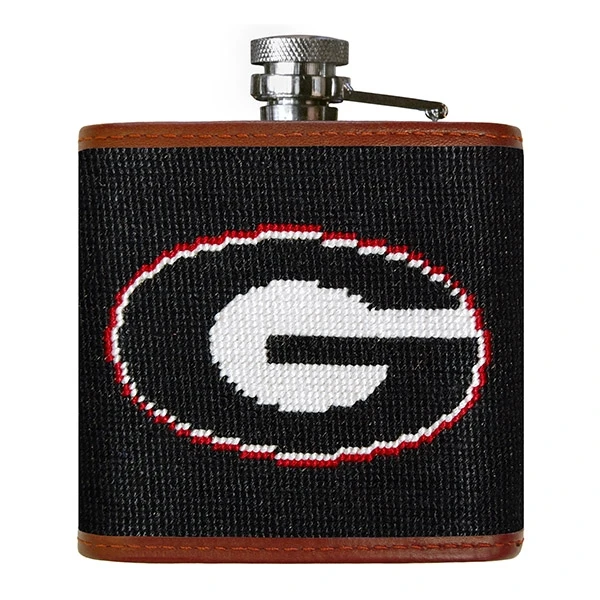December 4, 2021 is the date of the 30th SEC Championship Game, which may come as a surprise to some fans of the 89-year-old conference.
In 1992, with the addition of Arkansas and South Carolina, the SEC took advantage of an NCAA rule that allowed conferences with 12 members or more to organize into divisions and hold a championship game at the end of the regular season, thereby circumventing NCAA limits on the number of games a team could play in a season. The SEC became the first NCAA conference—in any division—to hold a football championship game.
The University of Georgia has been involved in eight SEC Championship Games, and while some have been ecstatic victories and some have been crushing defeats, they were all memorable in their own way.
Back in the game (for the first time)
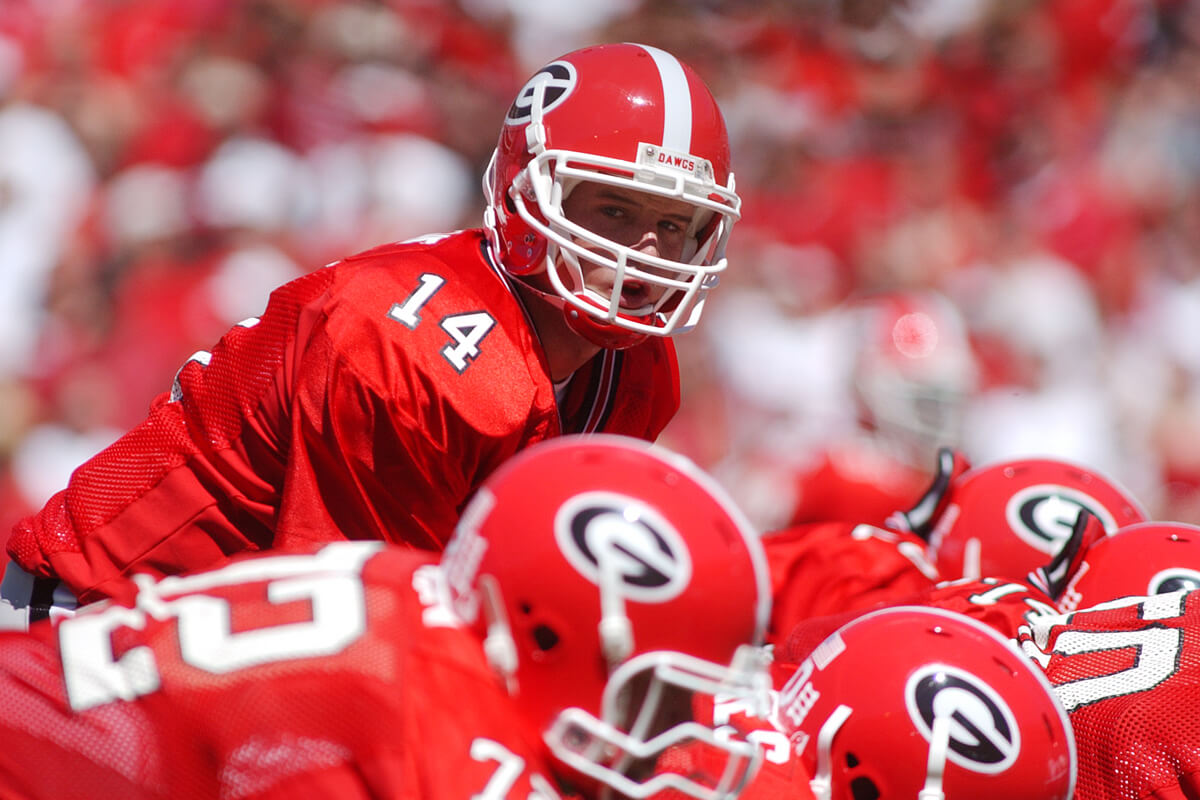
On Nov. 16, 2002, at around 6 p.m. in Auburn, Alabama, Michael Johnson reached up and pulled UGA out of a 20-year drought.
Of course, neither he—nor anyone else—could know that at the time, but the energy that had built up over Mark Richt’s second season at UGA made believers out of many long-suffering Bulldog fans. With that heart-stopping, fourth-down connection against Auburn, the Bulldogs closed out their SEC slate with only one loss, good enough to finish first in the East and earn the Dawgs’ first-ever trip to the SEC Championship Game.
The situation in the SEC West was much murkier. Alabama finished with the best record, but they were forbidden from postseason play due to NCAA probation. Behind them was a three-way tie for second between LSU, Auburn and Arkansas. The Razorbacks had head-to-head wins over the others, so they became the West’s representative in Atlanta.
And representing the West was about all they did in that game. UGA came out guns-blazing, scoring 17 points before Arkansas even gained a yard of offense, and took a 23-0 lead into halftime.
One final UGA touchdown and an Arkansas field goal later, the game ended 30-3 Georgia. The dominant win would earn the Bulldogs a trip to the Sugar Bowl—a game they would win 26-13 over Florida State—and their first SEC championship in 20 years.
A dish best served cold
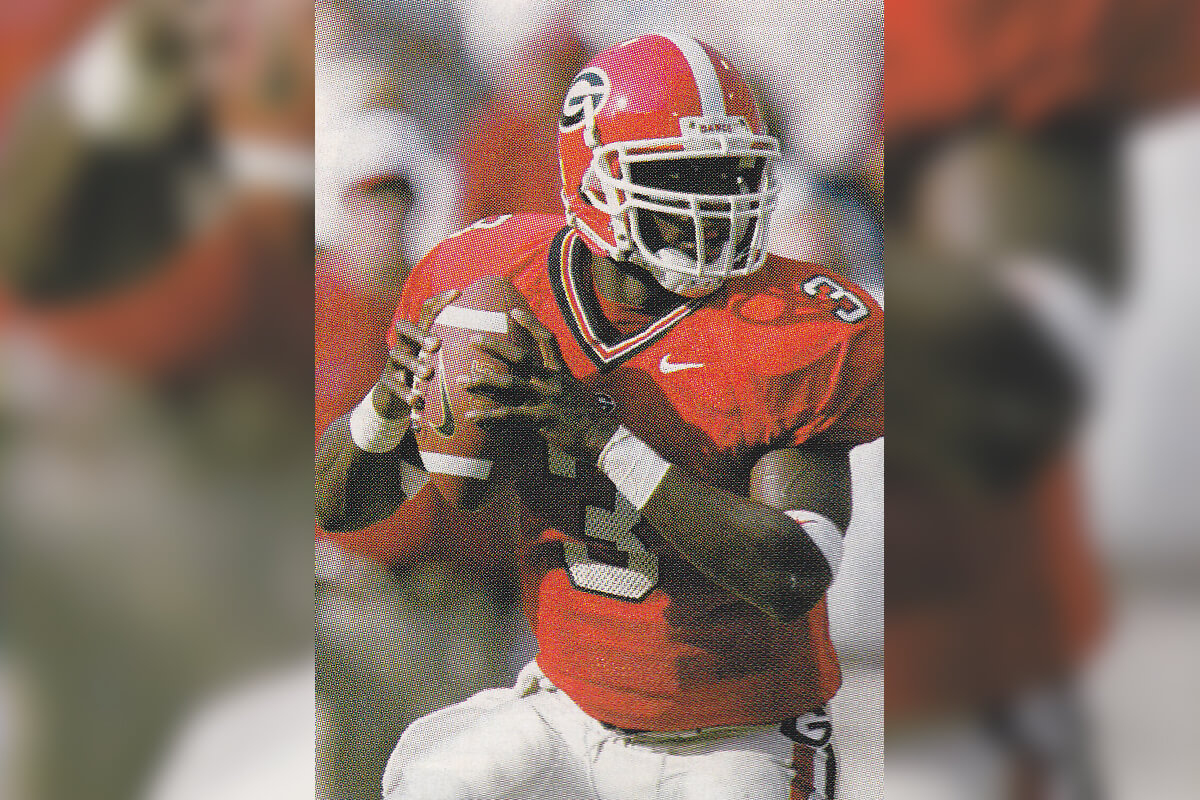
In the days before the 2005 SEC Championship Game, the narrative was “revenge.”
For UGA, this was a chance at payback for 2003, when the Nick Saban-led LSU Tigers beat the Dawgs twice in one season: by a respectable 7-point margin in the regular season, and by an embarrassing 21-point margin in the conference title game. The Bulldogs had enjoyed some small amount of vengeance in 2004, but the bitter taste of that 2003 SEC Championship Game remained.
For LSU, they could avenge that 45-16 beatdown in Athens from 2004. And getting revenge would be doubly important because, in 2005, LSU was breaking in first-year head coach Les Miles following Saban’s departure for the NFL. They needed to prove that their winning ways didn’t leave with him.
Both teams earned their spot in the title match. LSU claimed victory against Arizona State, Florida, Auburn and Alabama, none of which ranked lower than no. 16. Georgia had wins against ranked Boise State, Tennessee and Georgia Tech teams, but their losses to Florida and Auburn meant that LSU would be the favorite to win the conference.
But the Dawgs had D.J. Shockley, and LSU did not.
Shockley would be named the MVP of the game—and justifiably so—but this was a team effort. Two timely interceptions—one midway through the first quarter, another at the start of the fourth quarter that turned into a pick-6—shut down LSU drives, and a blocked punt in the second quarter gave UGA a short field that Shockley took advantage of.
By the final whistle, Georgia had its revenge: a 34-14 win and the Bulldogs’ second SEC title in 4 years.
Five yards from glory
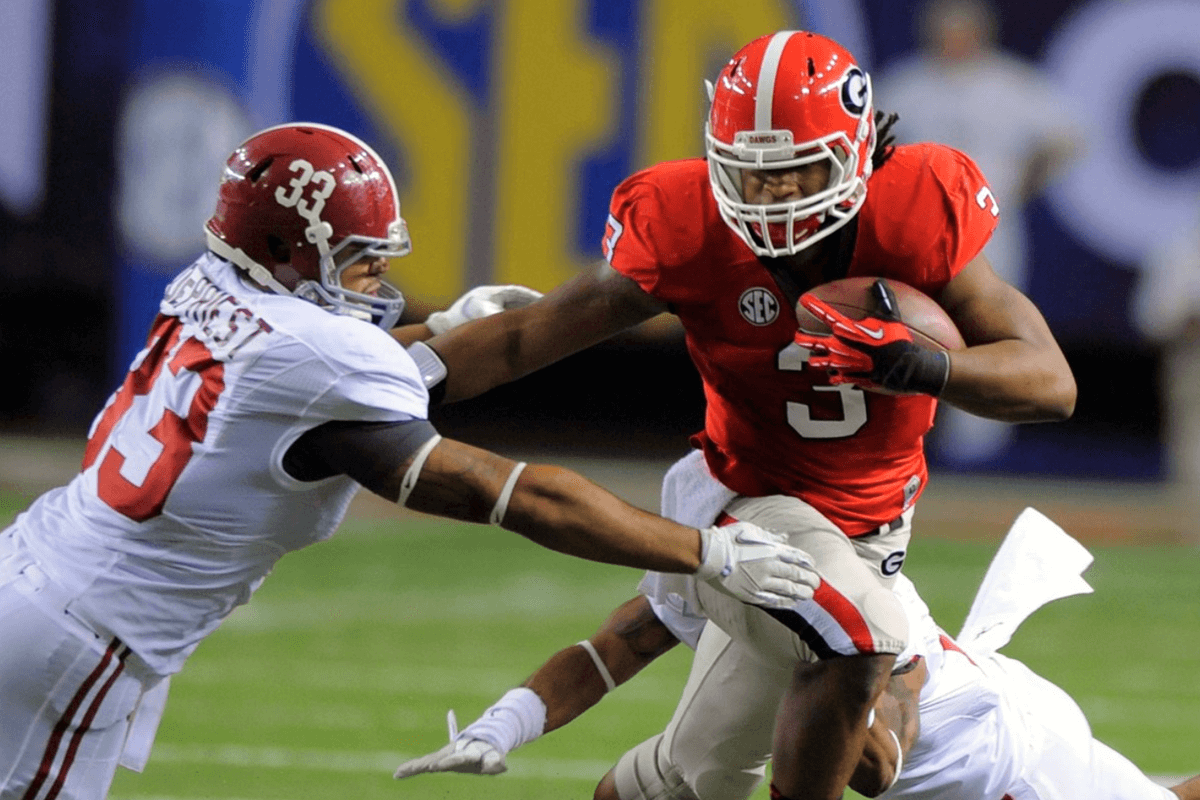
The 2012 SEC Championship Game was a titanic struggle full of drama and laden with national championship implications, presaging today’s UGA-Alabama rivalry for reasons both wonderful and terrible.
A scoreless first quarter suggested this might be a defensive affair. But the game began in earnest with the first snap of the second quarter.
UGA flailed against Kirby Smart’s defense for the remainder of the half, and with two minutes left before halftime, Alabama running back Eddie Lacy broke away for a 41-yard touchdown run to even the score at 7. Georgia QB Aaron Murray was intercepted deep in Alabama territory on the next drive, and Bama was able to take the lead with a field goal as the half ended.
The third quarter, however, belonged to the Bulldogs. Todd Gurley scored 3 minutes into the second half, and roughly six minutes later, Alec Ogletree turned the Georgia Dome upside-down.
Georgia now led by 11, but Alabama answered with a T.J. Yeldon touchdown and two-point conversion just minutes later, and Eddie Lacy started the fourth quarter with a touchdown that gave Alabama the lead once again: 25-21.
Two minutes later, Gurley took it back.
UGA held this lead, 28-25, until 3:15 in the fourth, when Amari Cooper broke loose on what is likely an eerily familiar play for Georgia fans. The long touchdown gave Alabama a four-point edge with just minutes left in the game.
On the following Bulldog drive, Alabama stymied the Georgia offense and forced a punt with two minutes to go. The Dawgs’ defense returned the favor, keeping the Tide from moving the ball and using all their timeouts to preserve the clock. After receiving the subsequent Alabama punt, UGA had one last chance with about a minute left from their own 15.
Backed by the sound of Bulldog Nation’s gnashing teeth and murmured prayers, the Dawgs began their million-mile march to victory. Murray and his offense escaped catastrophe, soared through the air, raced for the sidelines, and stared in the face of certain doom all the way down to the Alabama 8-yard line.
After this last first down, Murray looks to the sidelines and motions for a spike, to stop the clock and give the offense time to regroup. But the offense races ahead of him, setting up for the next play. We can only assume the coaches saw something they liked in Alabama’s on-field personnel, or perhaps they thought they could catch the Tide off-guard.
Ten seconds. The ball is snapped.
Eight seconds. Murray throws to his right, where Chris Conley is running a 3-yard out route and Malcolm Mitchell is headed for the end zone. An Alabama defender leaps forward and his hand collides with the ball. It takes a dramatic vertical arc.
Seven seconds. Chris Conley turns to see a ball headed in his direction. His reaction reads as surprise. Somewhere in his thinking, he likely knows the clock is moving, that he is too far from the sideline, and that he is not in the endzone. But for his entire life he’s trained to be a receiver: someone who catches the ball. So, with a ball heading his way, five yards from winning a conference championship, he does what he has trained to do.
Six seconds. Conley hits the ground, two yards from the sideline, five yards from the goal line. The clock keeps moving.
Three seconds. Conley climbs to one knee. Everything is moving too fast.
Five weeks from now, Alabama will go to Miami and destroy the Fighting Irish. They will easily claim Nick Saban’s third national championship at Alabama. And every Georgia fan watching will know, deeply and without reservation, that had the Dawgs been there, they would’ve done the same.
But right now, there are three seconds left. Not enough time to win, but more than enough time to think about how close you were.
Georgia fans would spend five years in those final seconds. The 2013-2015 seasons would be marked by an inability to win “the big game” and return UGA to championship contention, and those years would become the conclusion of the Mark Richt era. It was not the ending fans would’ve wanted for the coach who pulled them out of the morass and into national prominence, but it did lead to the hiring of another coach—ironically, one who was partially responsible for 2012’s tragic finish—who would lift the Dawgs to new heights.
As time has passed, the pain of 2012 has dulled and the vast majority of Bulldog Nation is able to appreciate the full scope of Richt’s tenure, all its triumphs and tragedies. Of course, it doesn’t hurt that we’ve been able to make some new, better memories in the championship game.
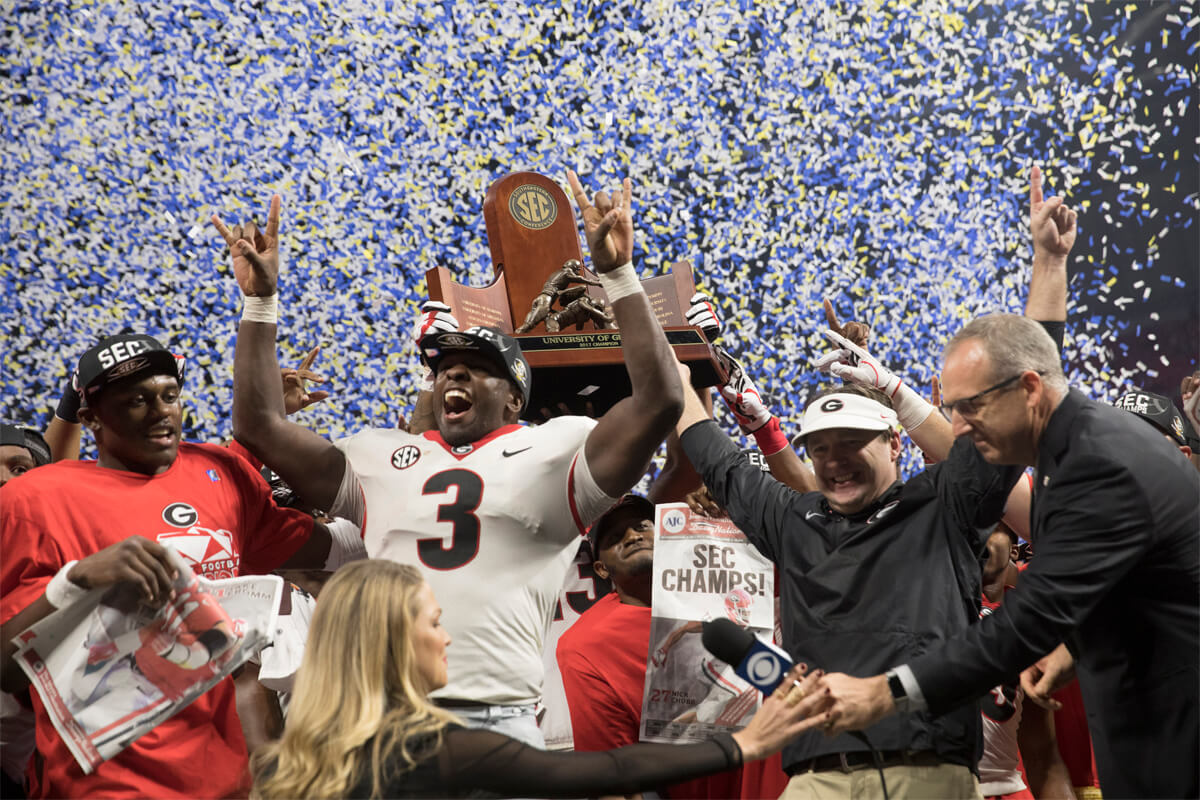
This Saturday, Georgia will face a familiar foe for the Dawgs’ ninth SEC Championship Game. Our history with the Tide is what it is, but more than anything, it is just that: history.
On December 4, 2021, a Bulldog team that is undefeated in SEC play for the first time in 39 years, 12-0 for the first time since 1980 and boasting one of the best defenses in school history will take the field in Mercedes-Benz Stadium for their first-ever game against an Alabama team that went to the wire against Florida, Arkansas and Auburn.
It’s time to write some history.


